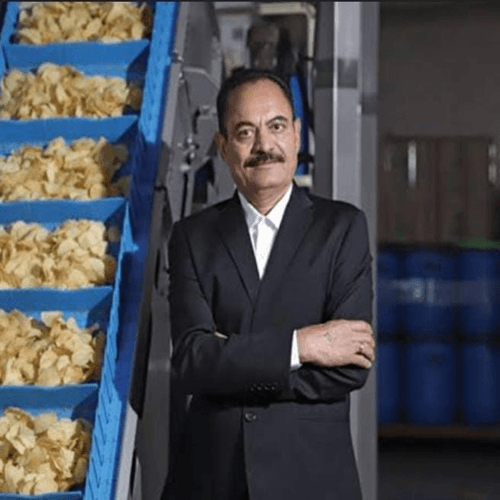How Farmer's Sons Made a Business worth 5000 Crores: Balaji Wafers
In the world of startups, The Story of 3 Brothers resonates with their unbeatable spirit. Today Balaji Wafers has become a household name, synonymous with quality snacks and delightful flavours. It is the second most-liked wafers and chips brand in India after Lays. Behind this iconic brand is the extraordinary journey of its founder, Chandubhai Virani and his brothers, a story marked by resilience, vision, and unwavering determination.
Finding multibagger stocks is important for building wealth. Discover potential multibaggers at Sovrenn Discovery
Humble Beginnings and Early Struggles
He was born into a modest family in Doraji village of Jamnagar, Gujrat in 1957. His father Popat Bhai Virani was a farmer. He had 3 sons, all of them were dependent on farming for their livelihood. Chandubhai Virani's early life was filled with financial challenges. He studied only up to the 10th grade. He and his brothers Meghjibhai and Bhikhubhai faced the harsh realities of life from a young age. The hardship journey started in 1972 when the lack of rains made farming untenable in Gujrat. Due to hardships, their father had to sell his ancestral farming land for 20,000.
First venture
After selling the property, the family relocated to Dhundoraji and started anew with their father's meagre savings of 20,000 in the hope of a better future. They decided to begin a business in fertilizers and farm implements with Rs 20,000. However, they experienced full failure in their venture and were being cheated due to their inexperience. Due to family financial conditions in 1974, Chandubhai and his brothers moved to Rajkot and looked for a job. For living expenses, they juggled multiple minor jobs, from repairing cinema seats to pasting posters etc.
Finding multibagger stocks is important for building wealth. Discover potential multibaggers at Sovrenn Discovery
Foundation of Balaji Wafers
In 1976, the Virani brothers’ dedication, at Astron cinema earned them a canteen contract worth Rs 1,000 per month. Initially, they sold sandwiches, but they faced losses due to short shelf life. They sought a storable product, so they pivoted to wafers. After initial reliance on vendors led to delays, Chandubhai began making his own wafers. The chips' quality and taste garnered immense appreciation.This was the time when Chandubhai noticed the patrons' love for wafers in the canteen. He sensed an opportunity and decided to do something of his own. He started the production of homemade chips in a temporary shed at his residence with a modest capital. He also taught his brothers to cook potato wafers.
The success of Balaji Campany
In 1982, Chandubhai and his brothers founded Balaji Wafers by investing Rs 10,000. Their dedication and commitment to quality paid off, and the business began to flourish. They distributed wafers to a few nearby retailers near Rajkot. The scale was small but their dreams were pretty big. In 1989, Balaji Wafers established Gujarat's first fully mechanized potato chips factory in Aji GIDC, Rajkot, propelled by modest chip sales and a bank loan. Three years later, in 1992, the Virani brothers officially incorporated Balaji Wafers Private Ltd. The brand name was inspired by a small idol of Lord Hanuman who cherished and symbolised their faith and determination. In 1995, The company set up a fully automated manufacturing plant and extended the line of products to Namkeen and other snacks.

Also Read: From Small Village to the Cannes Film Festival – Nancy Tyagi’s Cinderella Story
In 2006, Balaji Wafers commanded a 90% share of Gujarat's potato chips market. They continued to expand, establishing production facilities in Rajkot and Valsad, with the capacity to produce 3,400 kg of potato chips every hour. In 2019, the company had over 65 product ranges. They had a presence in the remotest of areas to sprawling cities. It had a distribution network of over 1225 dealers. Balaji Wafers now employs nearly 250,000 individuals and processes a staggering 6.5 million kg of potatoes and 10 million kg of namkeen daily.
Balaji Group's unique approach to business focuses on treating every member like family and providing 'Value for Money' to its customers. The company's growth has been driven by this ethos, ensuring quality and affordability for its vast consumer base. Today, Balaji Wafers enjoys a 13.7% share of the local potato and vegetable chips market and has ambitious plans for further expansion.
The Man Behind the Success
Despite his monumental success, Chandubhai Virani remains a humble and grounded individual. At 60, he continues to lead a simple life, often seen in modest attire and spending his free time admiring nature. His interests span from farming literature to enjoying traditional Kathiawadi cuisine.
Chandubhai's journey from hardship to helming a business empire is a story of self-belief and hard work. His dedication and tenacity transformed Balaji Wafers from a small cottage industry into a multi-million-dollar company, inspiring countless aspiring entrepreneurs along the way. It shows that with hard work, innovation, and a commitment to quality, even the most humble beginnings can lead to extraordinary achievements.
Balaji Wafers Net worth
Balaji Wafers had crossed Rs 5,000-crore annual sales mark in the year ended March 2023. The company posted sales of Rs 5,010 crore for FY23 and a 24% jump compared to last year.
Written By Manvi
